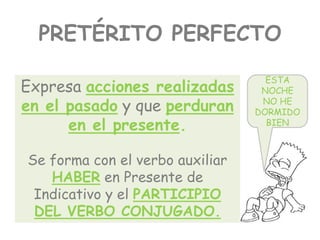Pretérito perfecto
•Als PPTX, PDF herunterladen•
0 gefällt mir•1,001 views
El documento explica el pretérito perfecto, un tiempo verbal que expresa acciones realizadas en el pasado cuyos efectos perduran en el presente. Se forma con el verbo auxiliar "haber" en presente de indicativo y el participio del verbo conjugado. Además, proporciona ejemplos de participios irregulares y marcadores temporales que se usan con el pretérito perfecto como "esta noche", "este año" y "nunca".
Melden
Teilen
Melden
Teilen

Weitere ähnliche Inhalte
Was ist angesagt? (20)
III- El pretérito de los verbos irregulares (los verbos -car -gar -zar)- Apuntes

III- El pretérito de los verbos irregulares (los verbos -car -gar -zar)- Apuntes
Mehr von julianaalferreira
Mehr von julianaalferreira (12)
Pretérito perfecto
- 1. PRETÉRITO PERFECTO ESTA NOCHE NO HE DORMIDO BIEN Expresaacciones realizadas en el pasadoy que perduran en el presente. Se forma con el verbo auxiliar HABERen Presente de Indicativo y elPARTICIPIO DEL VERBO CONJUGADO.
- 3. Participios Irregulares ABRIR- ABIERTO DECIR- DICHO DESCRIBIR- DESCRITO ESCRIBIR- ESCRITO HACER- HECHO PONER- PUESTO ROMPER- ROTO VER- VISTO VOLVER- VUELTO CUBRIR- CUBIERTO DESCUBRIR- DESCUBIERTO MORIR- MUERTO RESOLVER- RESUELTO
- 4. ¿Quién ha abierto la puerta? ¡Caramba! Todavia no he escrito nada. ¿Has dicho algo? ¡No te oigo!
- 5. ¿Dónde has puesto el coche? ¡He vuelto! ¿Quién ha hecho el almuerzo? ¡Homer, no te he visto antes! ¿Por qué?
- 6. MARCADORES TEMPORALESSe usa el Pretérito Perfecto con… Este mes Esta manãna Hoy Esta noche Este año Este fin de semana ¡Nunca he comido nada como esto! Esta semana Este verano Siempre Esta tarde